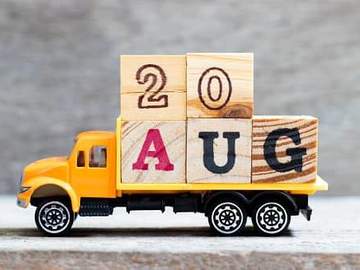
’Schadenfreude’
Schadenfreude spiked in lookups this week, following news that the Governor of Texas, known for his opposition to requiring masks, had contracted COVID-19.
I've Got a Serious Case of Schadenfreude Thanks to This Greg Abbott News
— (headline) Esquire, 18 Aug. 2021
We define schadenfreude as “enjoyment obtained from the troubles of others.” The word is borrowed from German, and comes from combining Schaden (“damage”) and Freude (“joy”). The last time schadenfreude spiked in lookups was October of last year, after President Trump also tested positive for COVID-19.
’Booster’
Booster was another COVID-related word from the week, as some governments and health agencies recommended issuing a third dose of the vaccine for the disease.
The Africa director at the World Health Organization, Dr. Matshidiso Moeti, criticized the decisions by some wealthy nations to start administering coronavirus booster shots, saying the decisions “make a mockery of vaccine equity” when the African continent is still struggling to get vaccine supplies.
— Abdi Latif Dahir, The New York Times, 19 Aug. 2021
The relevant sense of booster is “a substance or dose used to renew or increase the effect of a drug or immunizing agent; a supplementary dose of an immunizing agent administered as an injection.” The word has a number of additional meanings, including (but not limited to) “an enthusiastic supporter,” “a radio-frequency amplifier for a radio or television receiving set,” and “a shoplifter.”
’Evacuate’
The collapse of the Afghanistan government, and violent takeover of that country by the Taliban prompted a large number of news stories prominently featuring the word evacuate.
Fifty-five U.S. senators are urging President Biden to expeditiously evacuate Afghan special immigrant visa applicants whose lives are in jeopardy in the aftermath of the Taliban's takeover of Afghanistan.
— Barbara Sprunt, NPR, 19 Aug. 2021
Whenever such events as occasion the use of evacuate come about there is a small but devoted number of people who feel the need to weigh in on the use of the word. These evacuating purists feel people cannot be evacuated, only things such as buildings, cities, and states can be. The supposed reason for this is that because evacuate comes from a Latin word meaning “to empty” (evacuare) it should only be applied to things (such as cities) that are emptied of something else, and not to the contents (such as people) that are emptied. This is not a rule. It is the preference of a small group of nitpickers, and you do not need to pay attention to these people when they begin talking about the ‘correct’ meaning of evacuate.
The following senses of evacuate are all perfectly legitimate, and have been in common use for the past 150 years: “to remove (troops equipment, civilians) especially from a military position or zone; to remove (sick and wounded) from a combat area,” “to remove (a person or thing) from some place in an organized way especially as a protective measure,” and “to remove the inhabitants of (a place or area) especially as a protective measure.”
’Incel’
Incel spiked in lookups last weekend, after a man who committed a mass shooting in the UK was found to have referenced the word in videos he posted online.
Plymouth shooting: 'Incel' movement referenced by gunman Jake Davison of growing concern to UK police
— (headline) Sky News (news.sky.com), 13 Aug. 2021
We define incel as “a person (usually a man) who regards himself or herself as being involuntarily celibate and typically expresses extreme resentment and hostility toward those who are sexually active.” The word is a portmanteau (a word or morpheme whose form and meaning are derived from a blending of two or more distinct forms), formed from involuntary and celibate.
’Panglossian’
Also trending in lookups as a result of the tumult in Afghanistan was an eponymous word from French literature, panglossian.
The optimism here is Panglossian. As any military officer could have told her, the Afghan army’s equipment, numbers, and training are irrelevant in any measure of its strength, given the absence of combat support.
— Fred Kaplan, Slate, 11 Aug. 2021…The U.S. intelligence community. The Pentagon and its Panglossian generals. Experts pushing American leaders to stay the course. Those are just some of the answers NatSec Daily received when we asked U.S. officials, lawmakers and experts a deceptively complicated question: Who exactly is to blame for the swift collapse of the Western-backed Afghan government and the Taliban’s return to power after 20 years of war?
— Alexander Ward & Quint Forgey, Politico, 16 Aug. 2021
Panglossian is defined as “marked by the view that all is for the best in this best of possible worlds: excessively optimistic.” The word comes from Dr. Pangloss, the name of the pedantic tutor in Voltaire's satirical novel Candide. Incurably optimistic, Dr. Pangloss repeatedly claimed "all is for the best in this best of all possible worlds."
Our Antedating of the Week
Our antedating of the week is tintinnabulation, defined as “the ringing or sounding of bells” and “a jingling or tinkling sound as if of bells.” The word has long been thought to have originated in the writing of Edgar Allan Poe, who used it in his 1831 poem the Bells (previously our earliest known use):
Keeping time, time, time,
In a sort of Runic rhyme,
To the tintinabulation that so musically wells
From the bells, bells, bells, bells,
Bells, bells, bells—
From the jingling and the tinkling of the bells.
Recent findings have shown that tintinnabulation was in use prior to this, at least as far back as 1823, in a story with the curious title of Mr. Schnackenberger; or, Two Masters for One Dog, published in London Magazine.
At this moment Mr. Mayor, already wakened and discomposed by the violent tintinnabulation, rushed out: “What!” said he, “am I awake? Is it a guardsman that has this audacity?”
— London Magazine (London, Eng.), Jun. 1823



